
You are reading:

You are reading:
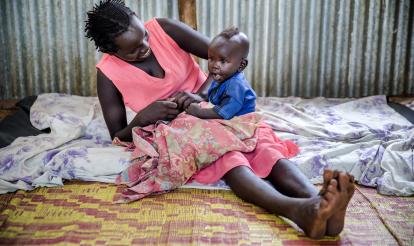
23.04.25
10 minutes readSend your questions to:
Directora del
Programa de Salud Materna, Infantil y Reproductiva de ISGlobal
In 2023, nearly 4.8 million children under the age of five died worldwide from preventable causes, according to the United Nations Inter-agency Group for Child Mortality Estimation (UN IGME). In response to this reality, initiatives such as the Child Survival Call, the Alliance for Child Vaccination or the MOM project reflect the firm commitment of the ”la Caixa” Foundation to improving child survival and life expectancy in vulnerable countries.
Since the year 2000, the global under-five mortality rate has decreased by more than half. Despite this significant progress, the figures remain alarming, and a child’s chances of survival still vary greatly depending on their place of birth. Sub-Saharan Africa is the region with the highest number of deaths of children under five, who are 18 times more likely to die than those born in Australia or New Zealand.
This disparity in child survival rates is influenced by factors such as economic conditions, fragility and armed conflicts, variables that contribute to inequalities in access to quality healthcare, adequate maternal and child nutrition and other essential services.
Over the last 28 years, the ”la Caixa” Foundation, through its International Cooperation Area, has positioned itself as a key player in the global support network aiming to reverse this situation. Through various programmes, it works on interventions designed to mitigate the inequalities affecting populations in these extremely vulnerable areas.
The United Nations Sustainable Development Goal (SDG) 3, specifically 3.2, aims to ensure that by 2030 all countries in the world reduce the mortality rate of newborns and children under five years of age to at least 25 per 1,000 live births. However, according to estimates from the 2024 Child Mortality Report (UN IGME), 60 countries will not meet this target.
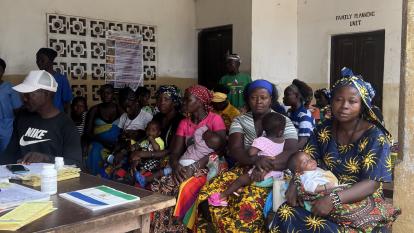
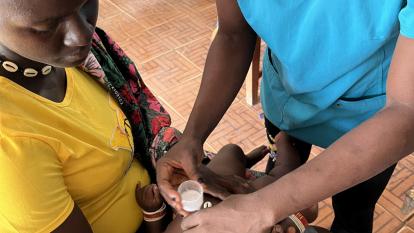
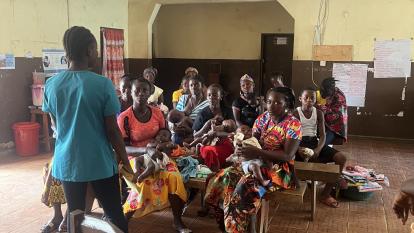
This is the case of Sierra Leone, a situation well known to Dr Clara Menéndez, director of the Maternal, Child and Reproductive Health Initiative and Programme at ISGlobal: “Sierra Leone is among the five countries with the highest under-five mortality rates. The leading causes continue to be infectious diseases such as severe respiratory infections, malaria and gastrointestinal infections, compounded by malnutrition, which is a consequence of these infections.”
Menéndez leads one of the projects selected in the Child Survival Call for Proposals 2024. It is aimed at improving child survival in Sierra Leone, particularly among children under two years old, who have the highest mortality rates: “We need to assess the barriers and difficulties in accessing available treatments and preventive measures for infections, especially malaria, pneumonia and diarrhoeal diseases, in order to find affordable solutions.”
In an initial phase, the project will assess the effectiveness of the Expanded Programme on Immunization (EPI) in Sierra Leone. Established by the WHO in 1974, the EPI aims to strengthen vaccination programmes and improve the supply and distribution of treatments. Based on the findings, Dr Menéndez’s team will prepare a report containing all preventive measures and proposals to optimise the system, taking into account the inherent challenges of the region.
This evaluation will encompass all profiles that may influence child health, starting with families: “Our priority is the parents, as they decide whether or not to take their children to the health centre, and we need to identify the factors that prevent them from doing so, especially for receiving preventive measures such as vaccinations.” To this end, they have a team of anthropologists on the ground who collaborate with other ISGlobal professionals specialising in mapping and geography for the study of distances.
“The main difficulty is physical access to many places,” explains the doctor. “Mothers have to walk with their children on their backs for an average of three hours along dirt or muddy paths, exposed to multiple risks, such as robberies.” The testimonies of mothers collected by the ISGlobal team are fundamental to understanding the reality of these families. “We’ve been working in Sierra Leone for over five years on other projects alongside the ”la Caixa” Foundation, and the families have never rejected treatments; on the contrary, they’re a very important source of support for our work, whose ultimate goal is to improve their quality of life,” emphasises Menéndez.
This 18-month initiative also includes the perspectives of other key stakeholders in the immunisation process, ranging from healthcare personnel who administer vaccines to district medical officers responsible for ensuring that treatments are delivered every month to healthcare centres.
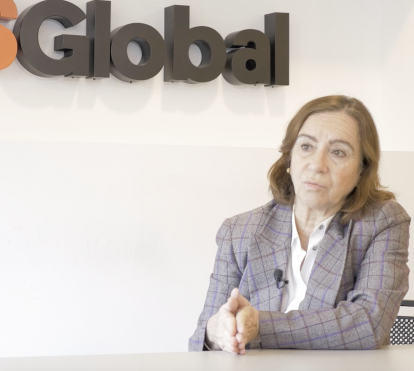
At another level, the team works alongside the directors of the malaria, child survival and immunisation programmes at the Sierra Leone Ministry of Health: “These are three fundamental pillars of the system, and our objective is to understand their challenges and support them to ensure that everything functions efficiently,” adds Dr Menéndez.
Once all barriers have been assessed, a report will be prepared for the Ministry of Health officials “to establish the necessary corrective measures,” concludes the doctor. One of the project’s objectives is to adapt the EPI programme’s interventions to the community’s needs, in order to improve its viability and sustainability, as well as to contribute to enhancing the training of 50 healthcare professionals from Sierra Leone by updating their knowledge and skills.
The Child Survival Call for Proposals 2024 of the ”la Caixa” Foundation supported three additional projects in sub-Saharan Africa: one to strengthen the health system and improve child survival in Uganda, led by Cesal; another to enhance maternal and neonatal care for vulnerable populations in Dar es Salaam, led by Comprehensive Community Based Rehabilitation in Tanzania (CCBRT); and a third to reduce maternal and child mortality in Commune VI of Bamako and the Sikasso region in Mali, led by Conemund. The second edition of these calls opens on Wednesday, 23 April.
In 2008, the ”la Caixa” Foundation became the first private partner of Gavi, the Vaccine Alliance, in Europe. Together, they launched the pioneering Alliance for Child Vaccination, with support from the Gates Foundation and ISGlobal. The coalition’s goal was clear: use immunisation to help save the lives of children in the most disadvantaged areas.
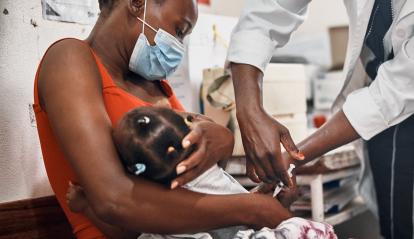
Today, this initiative is a well-established project that has already attracted many companies, clients of CaixaBank, as part of their corporate social responsibility programmes. “Thanks to the Alliance, a company can significantly amplify its contribution with a very small investment,” explains Alfonso Jiménez, director of GO fit LAB, a company that has joined the Alliance for Child Vaccination. “It gives you the feeling of having superpowers to transform the lives of those who need it most,” adds Jiménez.
Thanks to the Matching Fund initiative, the Gates Foundation and the ”la Caixa” Foundation multiply every euro donated by four, thus quadrupling the resources for the vaccination programme and enhancing the impact in the fight against child mortality. “The Gates Foundation provides philanthropic funding in collaboration with the ”la Caixa” Foundation, which has significant reach and capacity to attract other companies,” says Joe Cerrell, managing director for Europe, the Middle East and East Asia at the Gates Foundation.
Since then, thanks to over 400,000 donations, more than 100 million euros has been raised, enabling the immunisation – primarily against pneumonia – of over 11 million children in vulnerable regions of Africa and Latin America.
In 2024, Ethiopia granted asylum to 1,069,897 refugees and displaced persons, making it the third-largest host country in Africa. The conditions in which women and children arrive at refugee camps are extreme, and nutritional assistance is the most immediate urgency.
The alliance between UNHCR, the UN Refugee Agency, and the ”la Caixa” Foundation led to the launch of the MOM project in 2017, aimed at reducing infant mortality among children under five and their mothers in refugee camps in Ethiopia. The regions of Gambella and Melkadida host a significant portion of the refugee population, and it is in these areas where most of the initiative’s interventions take place.
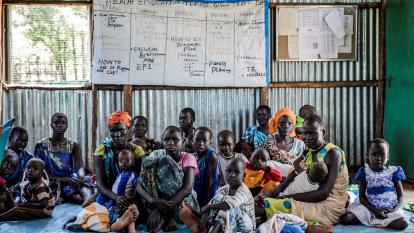
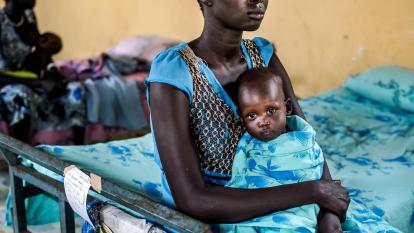
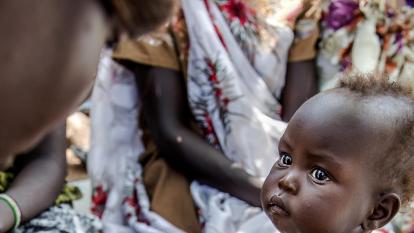
With a comprehensive, innovative and pioneering approach in its field, the MOM project includes such actions as training sessions for mothers, support groups for families, activities related to access to fresh food, community awareness campaigns and medical treatment for child malnutrition.
One of the key aspects of the programme is the training that mothers receive in the early detection of symptoms of malnutrition in their children. Hussein Geia, a worker at the Nguenyyiel refugee camp in Gambella, explains in the CaixaForum+ documentary Humanity that when families “arrive at the refugee camp, the first thing we do is take them to a waiting area and give them nutritional assistance.”
The importance of supplementary feeding to prevent severe malnutrition is a priority within the MOM project. “If the food ration is not enough, pregnant women and children need supplements. If they don’t receive that treatment, they have no chance of survival,” says Millicent Luigi, a UNHCR worker and specialist in the MOM project in Ethiopia, who also shares her testimony in the documentary.
Nutrition education is complemented by a vegetable garden programme that provides mothers with access to fresh food production to support their families: “It’s a programme that, on the one hand, is curative because it avoids severe malnutrition, and on the other hand, prevents it,” adds Millicent Luigi.
The testimony of mothers like Nyawika Gach, a refugee from South Sudan living in the Gambella camp, reflects the importance of the project: “My daughter was diagnosed with malnutrition and hospitalised at the Gambella Nutrition Centre. After receiving care, she improved and regained her appetite with the help of nutritional products. If she continues like this, she could be discharged in the coming months, which would be wonderful.”
All actions are accompanied by monitoring and data collection, which allow the analysis of results to generate long-term structural changes and to share good practices with other regions and humanitarian contexts.
Since the launch of the project in 2017, more than one million children under the age of five, mothers, pregnant women and nursing mothers have benefited. In Gambella and Melkadida, the MOM project has succeeded in reducing child malnutrition by 42%. In fact, 91% of the children enrolled in the programme make a successful recovery. Moreover, in 2023 alone, the contribution from the ”la Caixa” Foundation accounted for 76% of the total funding for projects to improve nutrition in these regions of Ethiopia.
Investing in child survival with initiatives like the MOM project, the Alliance for Child Vaccination or the Child Survival programme means nurturing human capital to foster economic development and improve the future for generations to come. Furthermore, the current global context has added a sense of urgency, as Dr Clara Menéndez emphasises: “The global context is different, and we’re facing a time of enormous difficulty in the field of global health. It’s imperative that the ”la Caixa” Foundation continues to support initiatives aimed at these types of vulnerable populations.”